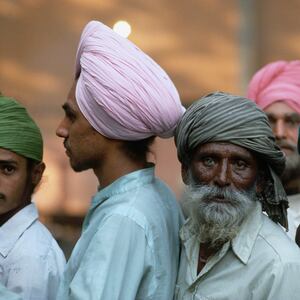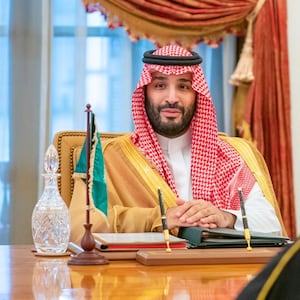Canadian Prime Minister Justin Trudeau’s explosive assertion this week that there are “credible allegations” that Indian agents are behind the killing of an outspoken Sikh separatist leader in British Columbia has kicked off a firestorm of diplomatic tiffs that threaten to escalate in coming days.
Hardeep Singh Nijjar, a staunch supporter of Khalistan, a sovereign Sikh state separate from India, was shot dead by two masked gunmen in June in Surrey. The men killed Nijjar, the president of the Guru Nanak Sikh Gurdwara, a Sikh place of worship, in the gurdwara parking lot.
India has vehemently denied the accusations that New Delhi was involved in the killing, calling the claim “absurd.”
ADVERTISEMENT
But Canada is holding to its moral claims.
“We are not looking to provoke or escalate, we are simply laying out the facts as we understand them, and we want to work with the government of India,” Trudeau told reporters.
Both Canada and India have expelled diplomats from either country in response to the public accusations this week. Canada’s Foreign Affairs Minister, Mélanie Joly, said she ordered the expulsion of Pavan Kumar Rai, the head of India’s foreign intelligence agency, the Research and Analysis Wing (RAW).
RAW has been suspected to be behind targeted killings in other countries for years, according to The New York Times.
The whirlwind of accusations and tit-for-tat responses could mark a pivotal moment for leadership in Ottawa around how far they are willing to take the allegations at the expense of the Canada-India relationship. In turn, the pressure might be on for western allies, too.

A sign outside the Guru Nanak Sikh Gurdwara temple is seen after the killing on its grounds of Sikh leader Hardeep Singh Nijjar, in Surrey, British Columbia, Canada on Sept. 18, 2023.
Chris Helgren/ReutersThe incident has plunged the Ottawa-New Delhi relationship to a new low, reigniting tensions that have threatened to bubble over for years. Canada is home to the largest population of Sikhs outside of Punjab, where an Indian government crackdown in the 1970s and 1980s killed thousands. In more recent years, India has been irked by demonstrations and referenda many Sikhs—including Nijjar—have held in Canada to rally support for a separate Sikh state.
Many in the Sikh community in Canada say India has been able to surveil, harass, and threaten them for years over their advocacy, the World Sikh Organization of Canada (WSO) told The Daily Beast. And the latest bloodshed has raised fresh concerns about Sikhs’ safety in Canada—and the Canadian government’s responsibility to step up for freedom of expression on Canadian soil—according to WSO Legal Counsel and Spokesperson, Balpreet Singh.
“They've been able to do it for decades without Canada reacting, without Canada really pushing back in any significant way,” Singh told The Daily Beast. ” Canada refused to really do anything about it because India was seen as a potential major trade partner… But a step too far is a targeted assassination.”
Ottawa has canceled a trade mission planned for October in India, despite previous promises to outline a trade deal by the end of 2023. India was Canada’s 10th-largest trading partner last year.
It is still unclear how long both Ottawa and New Delhi hope to hold off. But Canada’s interest in drawing a line in the sand could cascade into other countries’ relationship with India if they double down. For western countries, which have been counting on India to serve as a kind of counterweight to China in the coming years, the incident has so far presented a delicate balancing act.
Privately, Canada made the rounds before the G20 summit in New Delhi, urging senior officials from allied nations to take a stand against India, according to The Washington Post.
Publicly, however, officials have been more cautious. The United States has encouraged Canada to continue its investigation into the incident, urging India’s government to participate.
“We have been in close contact with our Canadian colleagues about this. We're quite concerned about the allegations. We think it's important there is a full and open investigation and we would urge the Indian Government to cooperate with that investigation,” a U.S. official said.
New Zealand’s Foreign Minister, Nanaia Mahuta, noted if the allegations prove to be true, “that would be of serious concern,” NZ Herald reported. Mahuta added “I won’t comment further on what is an ongoing criminal investigation in Canada.”
The U.K. has said it is aware of the “serious allegations.”
Australia—which along with the United States, Canada, the U.K., and New Zealand is a member of the intelligence sharing alliance known as the Five Eyes—added it was “deeply concerned by these allegations and notes ongoing investigations into this matter.” Australia went a step further than the others, according to its statement, noting it had raised the issue with India at “senior levels.”

Members of Pakistan's Sikh community take part in a protest in Lahore on Sept. 20, 2023, following the killing in Canada of Sikh leader Hardeep Singh Nijjar.
Arif Ali/Getty ImagesCanada’s government has said that reports that Canada requested allies to condemn India, only to get rebuffed, were false.
The response from the allies has been subdued so far, but Canada will likely expect more if India is indeed behind the assassination, Roland Paris, a former foreign policy adviser to Trudeau, told The Daily Beast.
“While I think that it is encouraging that there has been a supportive response from the White House, it is still muted,” Paris said. “And if it turns out that India was behind this murder, then I think many Canadians will hope and expect the United States to stand with Canada.”
If India is willing to do this in Canada, it is likely capable of doing it in other countries, warned Paris.
And though Canada’s reaction has been relatively swift, some in the Sikh community in Canada harbor concerns that it may be an uphill battle.
“How this goes is also going to depend very heavily on how Canada’s Five Eye partners support or don't support Canada in this endeavor,” Singh told The Daily Beast. “If Canada has now taken the stand, but the U.S., Australia, New Zealand, and the U.K. do not stand with Canada on this matter, and put a premium on Indian trade and ignore the fact that India is trending towards authoritarianism and basically denying democratic values, then I’m afraid Canada will be left standing alone.”
Governments around the globe use global intimidation, influence, and assassination plots to try to wield their influence and export repression on foreign soil, U.S. officials say.
But western government efforts to call them out and prevent them from happening in the first place appear to have mixed success so far. The FBI arrested two alleged Chinese agents earlier this year, for instance, for allegedly working to run intimidation and harassment schemes on U.S. soil. Other Chinese influence operations in the United States continue, U.S. officials said earlier this year.
The U.S. government has also called out multiple alleged Iranian plots to assassinate both a critic of Iran and a former U.S. official, former national security adviser John Bolton. Governments around the globe have called out Russia for poisoning plots targeting critics of Russian President Vladimir Putin for years.
U.S. government efforts to hold Saudi Arabia accountable for the killing of American journalist Jamal Khashoggi have grown complicated in recent years. The United States said last year MBS should be shielded in a lawsuit about his role in killing Khashoggi. President Joe Biden went from calling MBS a “pariah” to meeting with the crown prince himself.
Already, India is digging in its heels. The Indian government issued a new travel advisory Wednesday warning Indians in Canada to “exercise utmost caution.” India’s Ministry of External Affairs stated that threats have targeted “sections of the Indian community who oppose the anti-India agenda.”
India has typically protested against the actions of Sikhs in Canada by issuing travel advisories in an apparent attempt to silence the minority. Last year, when Canada allowed a referendum on Khalistan to take place in Ontario, India issued a travel advisory warning that there is a “a sharp increase in hate crimes and anti-India activities” in the country.
It’s exactly these kinds of responses that that have fueled concerns about foreign governments growing increasingly brazen in their work to export repression and coercion abroad.

Indian Prime Minister Narendra Modi welcomes Canada Prime Minister Justin Trudeau upon his arrival at Bharat Mandapam convention center for the G20 Summit, in New Delhi, India, on Sept. 9, 2023.
Evan Vucci/Reuters“There's a growing awareness in this country that different kinds of foreign interference in our society and politics are a growing challenge and that includes threats to members of diaspora communities living in this country,” Paris said.
A Sinking Feeling
Although Canada’s response to the killing of Nijjar so far has been swift, Canadian law enforcement and intelligence agencies have to step up, said Singh.
The Sikh community in Canada had a sinking feeling that Nijjar was going to be killed for advocating for Khalistan, Singh said.
Singh told The Daily Beast he was discussing it with friends the day that Nijjar was killed.
“I remember the day of Mr. Nijjar’s killing. We’re having a conversation amongst ourselves, just people that attend, saying that it looks like Nijjar’s life is in danger, because he's the logical next target,” Singh told The Daily Beast. “And by that evening we found out that he indeed had been shot dead.”
But it wasn’t just intuition or gut feeling, according to Singh.
Articles began surfacing last year focusing on “rising Sikh radicalization in Canada and the threat it poses to India’s internal security,” specifically naming Nijjar.
Canadian intelligence and law enforcement agencies had been aware of the threat to Nijjar, he said.
Singh told The Daily Beast he had personally reached out to the Canadian Security Intelligence Service (CSIS) last year on several occasions to warn them of threats to Nijjar in advance of his killing.
“I personally provided this information to CSIS,” Singh said. “From time to time, whenever I know of an issue that affects the Sikh community, and I think that law enforcement or intelligence needs to know, I contact them or they contact me and we have meetings. This is pretty standard stuff. But I had highlighted the fact that Mr. Nijjar’s life seemed to be in danger.”
Nijjar’s son confirmed that his father had met with Canadian intelligence on several occasions to discuss the threats. In the months building up to his killing, he was meeting with CSIS officers “once or twice a week,” including one or two days before his killing, his son, Balraj Nijjar, said, according to CTV News.
On at least one occasion, Mr. Nijjar and his son met with the Royal Canadian Mounted Police (RCMP).
But the fact that he was killed despite the red flags suggests Canada’s intelligence and law enforcement agencies have their work cut out for them, suggested Singh.
Singh said he hasn’t heard from the authorities since Nijjar’s assassination, but hopes that they are able to chart a new path.
“It’s on them. Whatever information I provided to them was not for my benefit, it was for the benefit of the general public or individuals I thought were under threat,” Singh said, adding that his door is open for talking. “I hope they learned their lessons.”
The WSO said Indian agents continue to pose an active threat to other Sikhs in Canada, and called on Ottawa to boost protections for Sikhs.
“There are other Sikhs in Canada who face an ongoing threat to their lives,” WSO President President Tejinder Singh Sidhu said in a statement. “Every possible measure must be taken to ensure their safety.”







